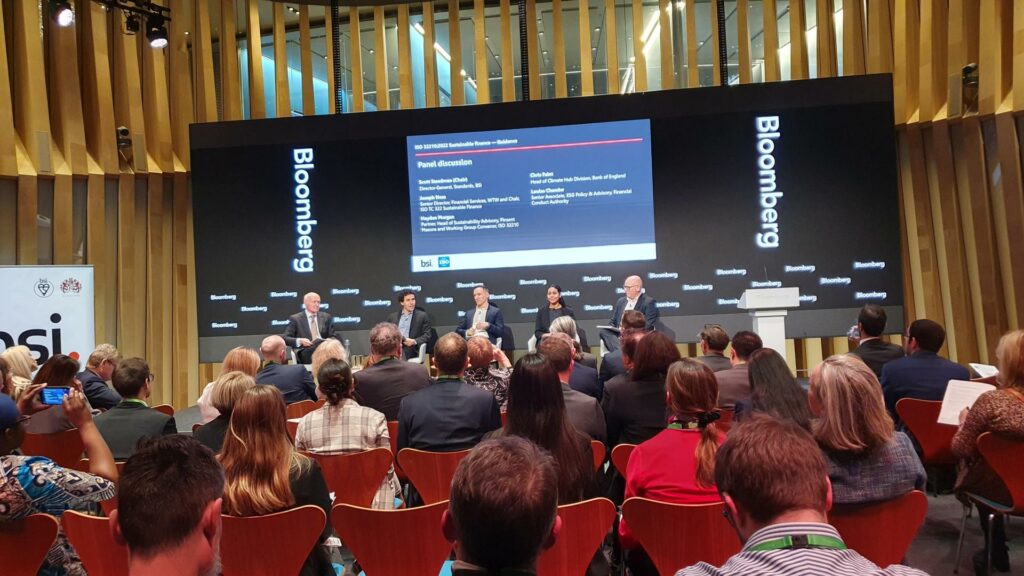
Posted 7th March 2023
A newly launched sustainable finance standard heralds “significant disruption” to accounting for the first time since the Victorian Era, the director-general of standards at the British Standards Insitute has said.
Scott Steadman said the BSI ISO 32210 Sustainable Finance Standard was a “collision between normal financial accounting and industry workflow”.
The standard provides the finance sector with guidance on how to apply sustainability principles to their work.
It was developed for retail banks, lenders and investors, asset owners (sovereign wealth and pension funds), asset managers, insurers and service providers.
Recipients of finance, public organisations, industry associations and financial market regulators, are also encouraged to adopt all or part of it.
Speaking at last week’s launch event at Bloomberg, London, Steadman said the standards’ launch coincided with a period of significant risk and opportunity for the sector.
Social Value UK Advocacy Lead Matthew Mckew attended the event to better understand what impact the standard could have on the global environment and to ask those present if social value had been considered.
He was encouraged by the sharp focus on better integrating sustainable practice within financial investment decisions. However, he noted the reluctance to implement regulation, when the UK Financial Conduct Authority’s representative was asked by Steadman how to get firms to abide by the new standard.
Social Value is not included within the standards, however, there was a general feeling among many who attended that it should go hand-in-hand with sustainable finance.
ISO Secretary General Sergio Mujica said the focus in developing the new standard was not on technicalities, but on creating an easier, safer and better world for people, with sustainability at the top of the agenda.
“There is a very strong sense of urgency… whatever we do today, we will only see an effect from in ten to 15 years, so we better start as soon as we can. 21 million people displaced every year, that is a reality today [under UNHCR’s mandate].”
Standard author Hayden Morgan wrote in the executive summary: “In some cases, it is anticipated that the standard may be referenced as pseudo-regulation where statutory sustainability requirements are absent or not enforced.”
The purpose of the standard concerned areas such as informing an organisation’s sustainability statement/policy, helping develop strategic goals, creating a stakeholder engagement plan and being used as a benchmarking system.

There was a broad sense of support, but ISO Risk Management Committee chair Russel Price put forward a challenge alongside his praise during the event:
“I want to point the finger back at investors and say why aren’t you asking for evidence of capability? Why aren’t you able to challenge companies you are investing in to be better in areas important to you – and that might be short-term gains or long-term developments.”
He further called for greater engagement with SMEs.
During a panel session, the Bank of England’s head of climate hub division Chris Faint called for more investment to be made with an eye on the future.
He suggested it would be better “if investments were based on not just what we are seeing today, in terms of carbon emissions, but on the trajectory of what will happen to those carbon emissions over time”.
“One of the things we are worried about is there is too much focus on right now, what is happening today… And it can count against transitions and can actually create risk.”
Faint called for the development of comparable data, to make firms more accountable for their emissions projections.
Joseph Noss of Insurance firm Willis Towers Watson added: “We will need to find a way of understanding what a credible transition plan would look like for a business.
“Investors can then disagree on how much value that will generate, but that’s what financial markets do, they allow people to express disagreement through price, through value.”
Posted 7th March 2023
